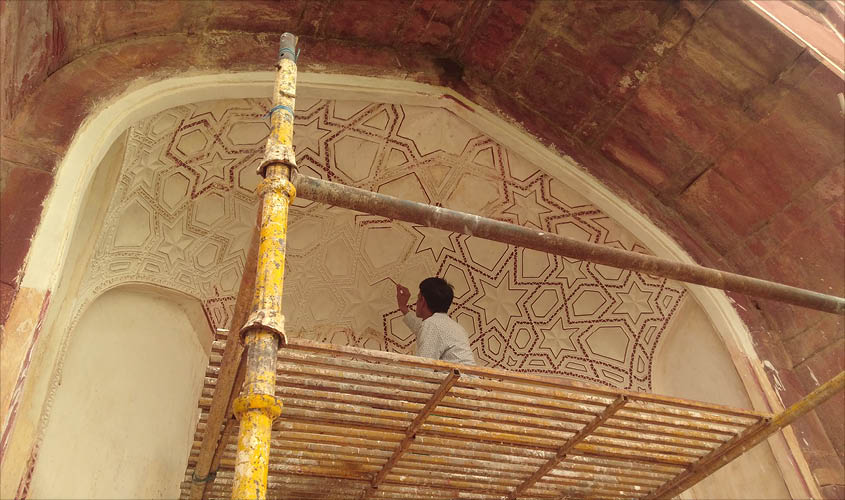Archaeological Survey of India (ASI) has taken up the work of conservation and preservation of historical monuments in Delhi with all seriousness. The work is at an all-time high at important historical monuments like Red Fort in Old Delhi and Humayun Tomb near Nizamuddin Dargah.
ASI officials assign top priority to the iconic Red Fort, especially the Mughal paintings at Chatta Bazaar within the fort premises which were recently discovered during the process of restoration and conservation.
Speaking to The Sunday Guardian, historian Rana Safvi said that the paintings were revealed after the paint was removed from the walls. “At Chatta Chowk, the workers found 19th century original Mughal paintings while removing the paint. More such illustrations are coming out.”
Safvi explained that the iconic work has been mentioned in many books, explaining that the paintings that existed. “But as Red Fort was first used by Britishers and then by the Indian Army, nobody knew about it until recently. The British were least bothered about the monument and demolished 80% of the monument as it is,” said the historian.
Speaking about conservation work at Red Fort, ASI’s Superintendent Archaeologist Navratan Pathak said, “The work is underway since January 2018 and we are looking forward to complete the entire process by the end of this year.”
An official at the Red Fort, who didn’t want to be named, also said that a lot of infrastructural development work is being done at the 370-year-old monument.
“Beside the conservation and restoration work, public pathways like washrooms and ticket counters are being constructed. Red Fort is at priority because of public pressure and is of national importance. The Mumtaz Mahal, which was earlier a museum, is being restored while the museum will be shifted to a different block,” said the official.
Pathak also said four new museums will be coming up at Red Fort. “The garden area, which earlier had been allotted 15 acre of land, has now been extended up to 35 acre. The ASI has ideas over different themes for the museums which are under process.”
However, sources mentioned that ASI is unhappy with the involvement of the Dalmia Group which had signed a memorandum of understanding (MoU) with the Ministry of Tourism to “adopt” the Mughal-era monument for next five years. The ASI authorities, however, refused to comment on it.
Meanwhile, Mughal emperor Humayun’s tomb is being conserved and restored by Aga Khan Trust for Culture (AKTC), where the work has almost finished. AKTC, with co-funding of Sir Dorabji Tata Trust and in partnership with ASI, has taken up the work at Humayun tomb and other monuments around it.
“This conservation work started in 2008 and was completed in 2014. The project is being carried out in partnership with government agencies. It’s a public-private partnership (PPP) funding model,” Archana Saad Akhtar, Programme Officer at AKTC, told The Sunday Guardian.
The work is divided and is funded by the organisations accordingly. “The conservation work is supported by the Tata Trust. Similarly, couple of our key projects like the Battashewala Complex is supported by American Ambassadors,” she added.
The conservation work at Humayun Tomb and monuments around it is aimed at restoring the architectural integrity. Most of the work has been done but the conservation work is still going on.
An artist working at Humayun Tomb said that preserving the original work is the most important task. “Working on the same material and design that was originally done on the monuments is a hard work and has to be carefully orchestrated,” said the artist.
Safvi mentioned that even after so much work, many monuments need a lot of attention. However, it becomes difficult due to lack of awareness among people, the historian rued.
Also speaking about ASI’s work, Safvi applauded the institution and said, “I feel ASI is doing quite well. But they still need to do more. ASI is not very well staffed, the government needs to strengthen the institute, get them more man power and allocate more funds to them because they have the capability to do so. ASI can do a lot of things if given proper attention.”

